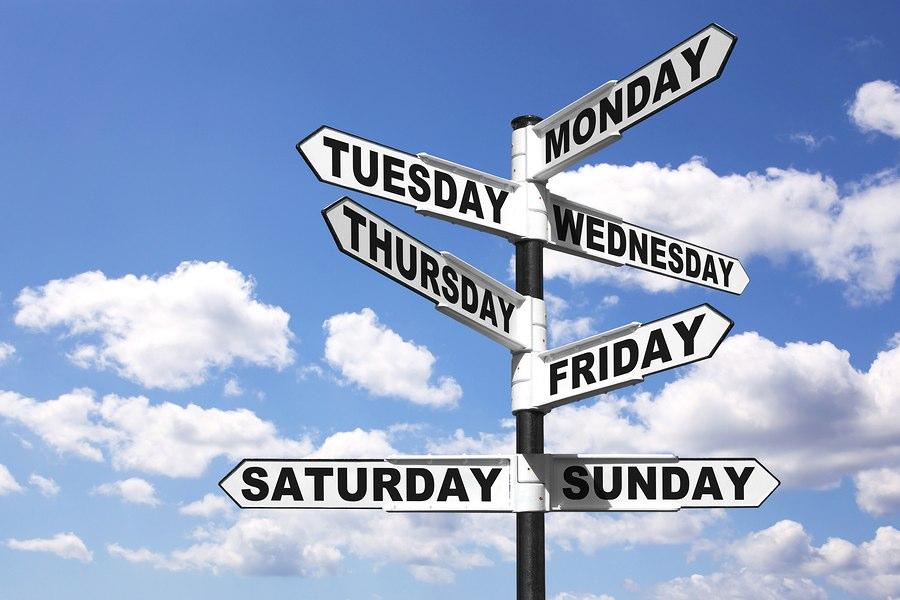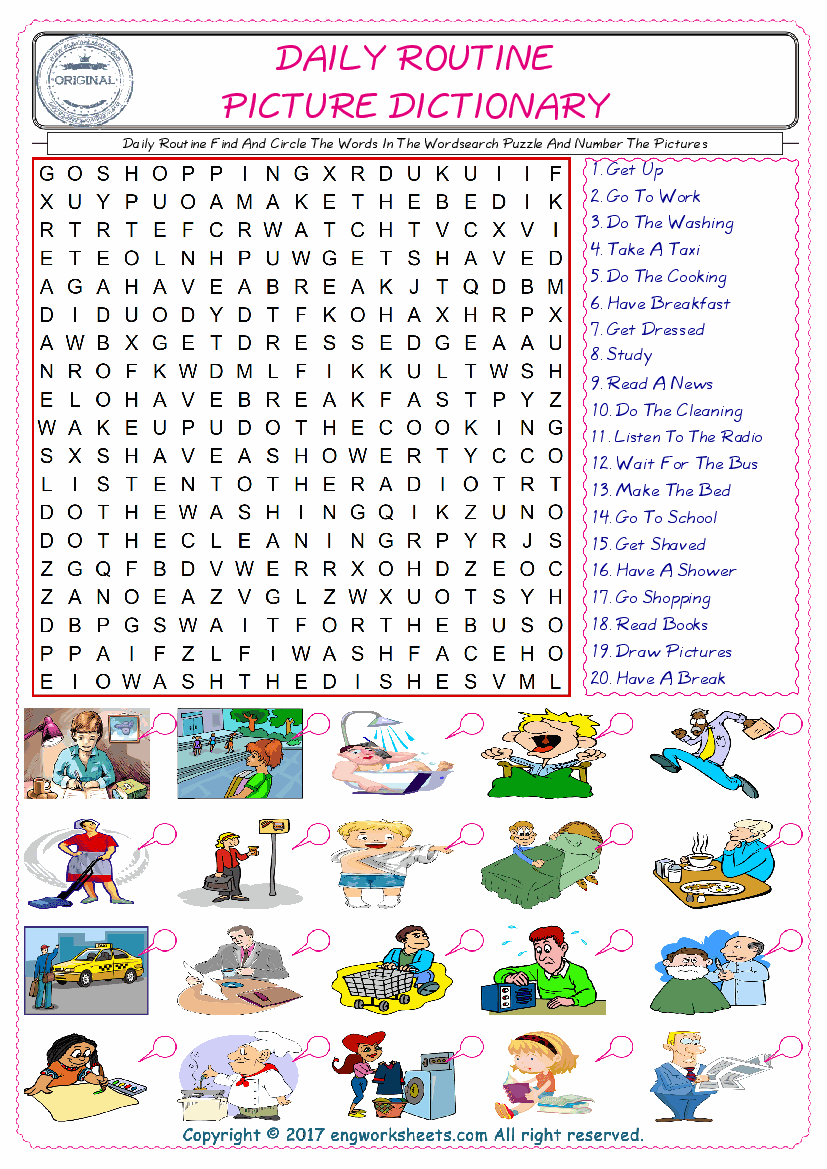Министерство общего и профессионального образования
Ростовской области
государственное бюджетное профессиональное образовательное
учреждение
Ростовской области
«Волгодонский техникум информационных технологий,
бизнеса и дизайна имени В.В. Самарского»
ДИДАКТИЧЕСКИЙ МАТЕРИАЛ
ТЕМА 1.6
Распорядок дня студента колледжа

Волгодонск
2018 г.
СПИСОК СЛОВ ДЛЯ ИЗУЧЕНИЯ ТЕМЫ “MY WORKING DAY”
wake up (early/ late) – просыпаться (рано/поздно)
get up - вставать (с кровати)
take a shower - принимать душ
brush my teeth - чистить зубы
shave - бриться
get dressed - одеваться
wash my face - умываться
put on makeup - делать макияж
comb my hair - причесываться
fix my hair - поправлять прическу
make the bed - заправлять кровать
get undressed - раздеваться
take a bath - принимать ванну
go to bed - идти спать
sleep - спать
sit around - рассиживать без дела
make breakfast - готовить завтрак
cook - готовить (еду)
eat - есть
have breakfast/ lunch/ dinner завтракать/ обедать, ужинать
have … for breakfast/ lunch/ dinner – есть … на завтрак/ обед/ ужин
clean the flat/house - убираться в квартире/ доме
sweep the floor - подметать пол
vacuum - пылесосить
wash the dishes - мыть посуду
microwave - подогревать в микроволновке
do the laundry - стирать
iron the shirt - гладить рубашку
feed the baby - кормить ребенка
feed the cat - кормить кошку
walk the dog - выгуливать собаку
watch TV - смотреть телевизор
be online - сидеть в интернете
surf the internet - лазить в интернете
listen to music - слушать музыку
play videogames - играть в видеоигры
be on the phone - висеть на телефоне
do sports - заниматься спортом
go to work/ school/ college - идти на работу/ школу/ техникум
get back from work (return from work) - возвращаться с работы
daily routine - распорядок дня (повседневные дела)
do housework – делать работу по дому
do the ironing – гладить
go shopping – ходить за покупками
have a rest – отдыхать
to go see smb – навещать кого-либо
take the dog out – выгуливать собаку
read books – читать книги
do morning exercises – делать зарядку
Примеры предложений по теме.
I do the same things every day. – Я делаю одно и то же каждый день.
Actually, I am the first/ second/ last to wake up in our family. – На самом деле я встаю первым/ вторым/ последним в нашей семье.
As my mother is still sleeping, I make breakfast myself. As a rule, it is a sandwich and a cup of tea. – Так как моя мама все еще спит, я готовлю завтрак сама. Как правило, это бутерброд и кружка чая.
At 8 o’clock I leave home for school. – В 8 часов я ухожу из дома в школу.
It takes me 20 minutes to walk to school/ to get to school by car/ by bus. – Это занимает у меня 20 минут, чтобы дойти до школы пешком/ добраться на машине/ автобусе.
I usually come back home at 16 o’clock as we have 7 or 8 lessons a day. – Я возвращаюсь домой в 4 часа, так как у нас 7 или 8 уроков.
On the day when I don’t go to courses I can afford to relax a little. – В тот день, когда я не хожу на курсы/ дополнительные занятия, я могу себе позволить отдохнуть немного.
I always sit up late doing my homework. – Я всегда засиживаюсь допоздна, делая домашнее задание.
That’s why I am the last to go to bed in the family. – Поэтому я ложусь последней в нашей семье.
I have a habit of taking a walk after dinner. – Я имею привычку прогуляться после ужина.
Lexical tests.
I. Choose the right answer.
1. I … at 7 o’clock in the morning
a) get up c)go to bed
b) has breakfast d)play chess
2. Then she …
a) get up c)go to bed
b) has breakfast d) play chess
3. … you watch TV everyday?
a) Does c)Are
b) Do d)Is
4. … he watching TV now ?
a) Does c)Do
b) Are d)Is
II. Correct the statements.
Watch the TV Go to on bed
Go to walk Great Africa
Clean the tooth Read a books
Do me homework In evening
Help the about house Haves supper
Hands and face wash Play in chess
III. Fill in the gaps with the proper word.
What, when, where
a) … do you get up ?
b) … does she do then?
c) … does she go after breakfast?
d) … do they come home from school?
e) … does she do at three o’clock?
f) … does he go swimming?
IV. Insert the proper word: tooth, men, women, children, teeth, man, woman, child.
This … is an engineer. These … are workers. This … is my mother. Those … are my aunts. This … is four. He does not go to school. The baby has got only one … My dog’s … are white and big.
V. Fill in the verb in brackets in the correct form.
1. Sam … in London. (live)
2. He … two small children. (have)
3. Jane … not … in Britain. (live)
4. She … not … up early. (get)
5. Henry … his breakfast at half past seven. (have)
VI. Find and correct the mistakes.
1. He live in Oxford
2. She sometimes eats in a restaurant.
3. On Fridays I to the cinema go.
4. What you have for breakfast?
5. Why do the baby crying?
VII. Ask questions to the given answers.
1. Michael works on a farm. Where … ?
2. Brenda lives inLeeds. Does …?
3. Luke likes tea with lemon. What … ?
4. Mary works at a bookshop. Where …?
5. We have six lessons on Monday. When … ?
VIII. Choose the correct answer.
1. In the morning we have… 7. The lessons begin at…
a) breakfast a) 8:00
b) lunch b) 8:15
c) dinner c) 9:00
d) supper d) 9:30
2. In the afternoon we have… 8. After the lessons pupils go…
a) breakfast a) to the market
b) lunch b) shopping
c) dinner c) home
d) supper d) to the cinema
3. In the evening we have… 9. Pupils do their lessons…
a) breakfast a) at home
b) lunch b) in the street
c) dinner c) in the yard
d) supper d) in the cafe
4. At school pupils… 10. At 9 o’clock in the evening pupils go to …
a) do morning exercises a) home
b) have lessons b) shopping
c) clean the rooms c) school
d) clean the teeth d) bed
5. Every morning pupils go… 11. Before going to bed pupils read …
a) to school a) TV-set
b) to the park b) day-books
c) shopping c) books
d) walking d) flowers
6. Children make their beds… 12. Pupils can help about the house …
a) in the morning a) in the morning
b) in the afternoon b) in the evening
c) at night c) at night
d) in summer d) in winter
IX. Complete the sentences
At 7 o’clock I ………… 9. At 2:30 I …………
At 7:15 I ………… 10. At 3 o’clock I …………
At 7:30 I ………… 11. At 6 o’clock I …………
At 7:45 I ………… 12. At 7 o’clock I …………
At 7:50 I ………… 13. At 8 o’clock I …………
At 8 o’clock I ………… 14. At 9 o’clock I …………
At 8:30 I ………… 15. At 10 o’clock I …………
At 2 o’clock I …………
X. Put the word-combinations into the columns
| Morning | Afternoon | Evening |
|
|
|
|
|
|
|
|
|
|
|
|
|
|
|
|
|
|
|
|
|
|
|
|
To get up; to have supper; to help about the house; to watch TV; to have breakfast; to go to school; to go to bed; to have dinner; to play games; to do morning exercises; to go for a walk; to wash; to make bed; to do lessons; to go shopping.
XII. Fill in the blanks with the correct daily routine.
Oh, that little green budgie! It ____ me up every early morning.
We have a tradition since our University years: every Sunday we go ___ and buy food for poor people from our local Charity Hospital.
If you want to have healthy white smile you have to ___ your teeth twice a day and visit your dentist once a year. But who visits them so often?
My day was so stressful. I`m waiting forward to a hot foamy bubbles. I can relax only when I ______.
I even haven`t got a TV set! So I don`t ____, indeed!
6. They presented me a dog for my birthday yesterday. But I have no time to ____! I`m 50 –years old successful businessman. Why didn`t they ask me first?
7. - Mum, can I watch my lovely cartoon? – Do your ____ first and then you can watch it!




A text for reading
My day off
Most people in our country work five days a week but students and pupils work six days. They have only one day off. It is Sunday.
I like this day very much. You needn't hurry anywhere and you may go wherever you like after your week's work. On this day I wake up later than usual. But sometimes I don't get up till nine or ten o'clock. I read morning newspapers or listen to music.
As soon as I get up I air the room, make my bed and do morning exercises. Then I have breakfast, clear away the dishes and wash up. Two more hours for getting ready with my homework, and I am free.
I meet my friends and we discuss our plans together. We may go to the cinema or theatre, to museums and parks. Last Sunday we went to the Botanical Garden. There were many beds of spring flowers there: red, yellow and blue. People in light clothes were walking along the paths. The air was fresh and clean. It was very pleasant to spend time there.
When the weather is bad my friends come to my place. We listen to music or go to the cinema. We like films about the life of the youth abroad. On the way home we usually discuss the films we've seen.
In the evening all the members of our family get together. We have our supper, make plans for tomorrow, watch TV or read books. Reading is my hobby. Sometimes we receive guests at our place or go for a walk. I enjoy my days off very much.
VOCABULARY
day off — выходной день
week-end — конец недели
hobby — увлечение
to enjoy — наслаждаться
to make plans — планировать
to spend time — проводить время
to discuss — обсуждать
to have a rest — отдыхать
to go to the country — ехать за город
to go for a walk — идти на прогулку
to listen to music — слушать музыку
to play games — играть в игры
to lie [lai] in the sun — загорать
to come to smb's place — приходить к кому-л
to receive guests [gests] — принимать гостей
QUESTIONS
1. Which day of the week do you like best and why?
2. What time do you get up on Sunday?
3. How do you usually spend your days off?
4. Do you often go to the country on your days off?
5. What are the best places around your city?
6. Do you go in for sports on Sunday?
7. Do you often go to see your friends?
8. With whom do you like to spend your days off?
9. Do you sometimes go to the theatre on Sundays?
10. How do you usually spend the evenings on your days off?
11. Do you sometimes receive guests on Sunday?




























